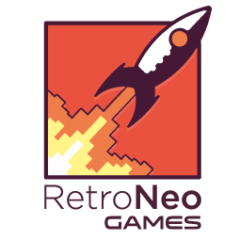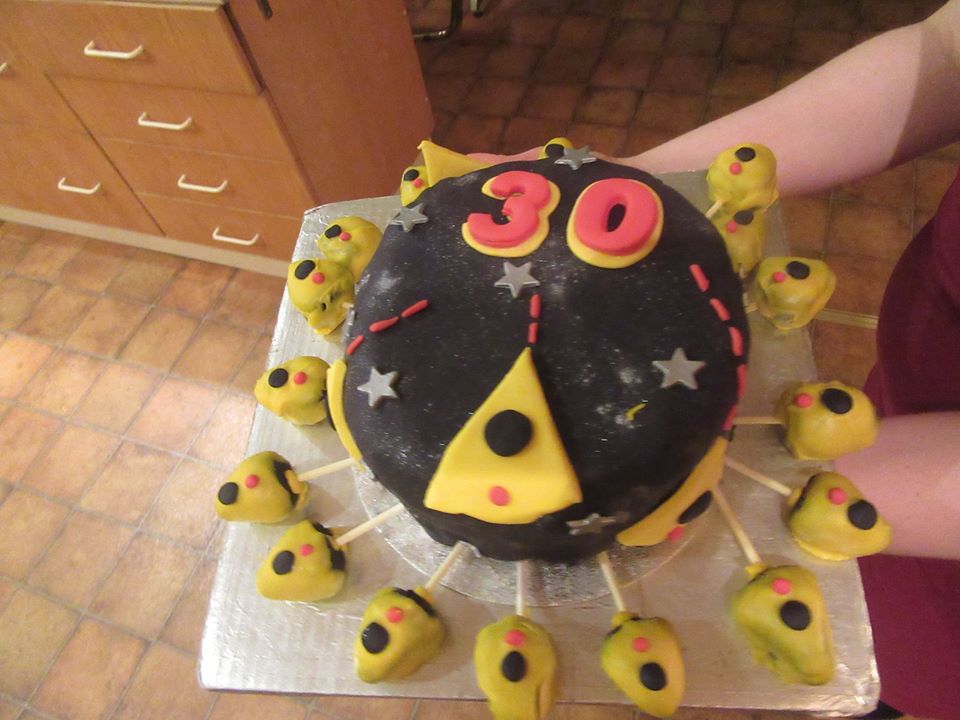[Preface to the preface]
This is the first blog since I started writing that I failed to deliver in the month that it was for. I wrote the preface but couldn’t finish the body, so I posted a ‘coming soon, sorry for delay’ notice in its place (so I could still have the January date for the post once I edited the content in) figuring that nobody would ever see it anyway. After all, nobody ever comes to read my new blogs until I go promote them, or so say my analytics, at least.
Figures then, that over 130 people, multiples of times my average blog readership, would come to read this post and see nothing! Sorry about that, folks. If you did come back, I hope it’s worth the wait. Sorry for the delay. I haven’t the same free time as I once did (it used to be ‘little’, now it’s ‘extremely little’), but mostly I just found this getting very lengthy, with me often having to go look things up, and overall it was just difficult to write at times.
In terms of length, I could easily have made this a 2 or 3 part post, but actually it just had to be one thing. I needed it done in one go. You can read it in 2 or 3 parts if you wish, of course. I also decided not to edit too much for length because this isn’t exactly an ordinary post, and everything in it is worth being said in one way or another.
[End of preface to the preface. Beginning preface.]
As promised in December, this month’s post is a follow-up to my June 2015 blog “My Bumpy Road To Game Development”.
It’s to serve as a check-in with my supporters (and with myself), a personal exercise in gratitude (and a learning experience), a case-study in games entrepreneurship, a peek behind the curtain for aspiring game dev students (or those wondering if they should just skip the degree), an update on Sons of Sol, or just whatever you get out of it.
Hopefully it’s at least a good story. I was loathe to write the original piece (talking about yourself?! Ewww!) but it proved very popular and people thanked me for sharing, so this one should perhaps be a little easier to write… sort of…
If you haven’t read the original, I’d encourage you to do so, particularly if you’re wondering whether you need to study to become a game developer, or if you want to see what life can be like for a ‘child of the recession’ in Ireland. Today’s opening section will make more sense if you’ve read the original, but the post as a whole can stand on its own.
Anyway…
Then ‘til now
As I read the original post back, it’s amazing to see how much has changed in 2 years and 8 months, and what’s stayed the same.
-
I’m still sitting in the same office as I write this post, but now it’s also my bedroom.
-
RetroNeo Games is now a Limited Company (Ltd in Ireland, LLC equivalent for USA).
-
Sons of Sol: Crow’s Nest is still the game I’m trying to make, but now it’s called just Sons of Sol. It certainly should have been done by now according to my initial plans, but that’s the way indie game dev tends to go.
-
I got Sons of Sol trademarked in the USA, so it’s now Sons of Sol™.
-
The game passed Steam Greenlight one year ago, before that system was done away with by Valve. We also appeared on Square Enix Collective, though made less of a splash there.
-
I was blogging every single week in 2015, and I didn’t miss a single one despite taking 3 weeks of holidays. I set the goal and I did it. This was exhausting and a bit of a waste of time though, so through 2016 and 2017 I dropped the target to 1 a month and even then I often struggled to think of something to write, but I haven’t missed one since then either, until this post. Now for 2018 I might drop the obligation that I’ve held myself to entirely, but that remains to be seen. I certainly felt that I owed people this update, especially anyone who pre-purchased the game during our Greenlight campaign. Blogging is still good for SEO and it’s been my experience so far that every time I thought of quitting the blog I was given one good reason to keep going, whether that was a retweet by John Romero leading to thousands of readers on this post, or my first (or subsequent) Gamasutra Feature(s).
-
I’m still making games, but I’m no longer an indie, at least, not primarily. There is still no commercially released game in the world that has my name in the credits – a goal I’ve held for years, though that should soon change as long as certain titles aren’t cancelled.
-
Imirt, the Irish Game Makers Association, was one month old when I wrote the original piece, and it’s been going quite strongly since. I’ve even become involved enough to write the Newsletter each month.
-
I see a photo in the original blog post with John and Brenda Romero. Little did I know then that I’d get the chance to work with them in the future!
-
I see mention of Gunman Taco Truck, a fantastic game designed by their son Donovan, which I was the first person ever to livestream on launch night. I believe anyway… I’ve also seen Donovan’s first public talk on the game live at Ship It Con in 2017.
-
Games that I name-dropped before, Darkside Detective, and Guild of Dungeoneering, have since launched and become small indie hits. Though I’ve nothing directly to do with them, I know the devs fairly well by now, even witnessing work sessions on Darkside by Dave & Tracey McCabe while we all sipped cocktails in both Siem Reap and Dubrovnik. Also, my team on Sons of Sol eventually came to involve both Dungeoneering’s incredibly talented artist and its composer.
-
The DubLUDO meetup in Dublin is a far less frequent affair these days. To fill the gap, I started The Games Co-Op (TGC) monthly meetup, which has since rolled in with the 1GAM (One Game A Month) meetup, which was basically responsible for the success of my self-directed game dev education. 1GAM gave me deadlines, a theme, and people to critique my work, and I’m happy to help keep it going.
-
One thing that hasn’t changed at all is the importance to my life of the game dev community for their advice, support, and most recently, for my employment. It’s why I started TGC. It doesn’t matter who you are in game development, you’ll have an easier time of it if you get out and meet people. In-person is far better than online, though where in-person is problematic, online is certainly better than nothing.
-
Where once I just knew local Irish developers fairly well, I went to conferences and now am friendly with devs and other games industry personalities all around the world. I especially enjoyed meeting people whose work I’ve admired for years; Cliff Bleszinski, Rami Ismail, Brett Douville, Mike Bithell, Scott Manley, Dan Vavra, Ben Prunty, and interviewing someone whose music I’ve loved since I was a kid; Frank Klepacki!
I found all of that from the original post quite interesting as I re-read it, but I was struck hard by a paragraph near the end of it:
I’m going to make “Sons of Sol: Crow’s Nest” as RetroNeo Games and I’m going to give it no less than everything I’ve got! This post has been the first half of a story. The next two years might make it a triumphant success story or just a sad, boring one…
I know I could fail. I know I have to steel myself against the possibility of a huge let down and further financial hardship, but at this stage, I’ve survived worse, and I can’t look back now!
[Laughs ironically] Yep. Okay, enough foreshadowing. Let’s get on with it.
What full-time, unpaid game-dev life is like(/was like for me)
Initial Designs and timetable
So I started off in May 2015 with my little prototype and big ideas. I wanted to create a unique (yet hopefully also nostalgic) game feel through the Asteroids-inspired controls, but to recreate the feeling that 3D space games like X-Wing and Wing Commander inspired in me as a kid. I also wanted the game to be replayable, and less scripted, so I planned for an XCOM-style strategy layer to connect each mission into the meta game. Early designs for this layer featured territories, fleets, spies, a nemesis system, multiple resources… yeah, now you just have one fleet and it’s all planned to be much simpler and compartmentalised, though without having compromised much on my core idea that each mission result matters, and the strategy layer is more than just a glorified level select screen.
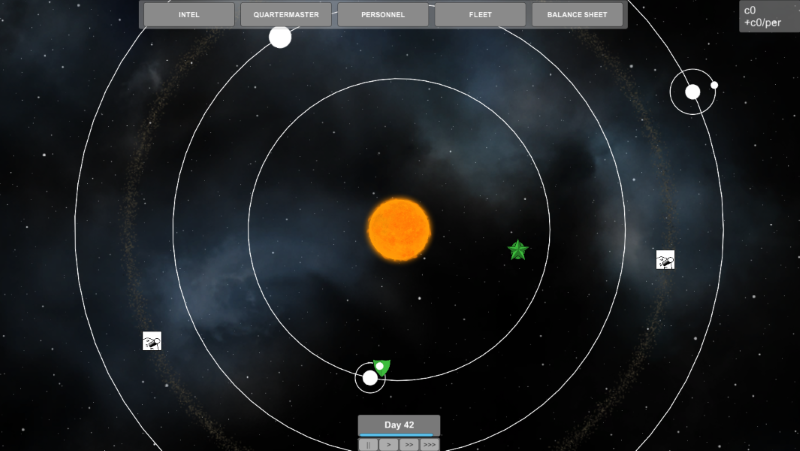
Having boarding craft board capital ships is a pretty cool staple of old space games, but they were always just a matter of waiting for a timer to run out, while some text or audio played. I wanted to make this an actual game mechanic instead.
In the first week or two, I thought I could conceivably have some interior ship-boarding levels, based on my Teluma or MIC’s Paintball games, but I quickly scrapped the notion, realising that I’d effectively be making a whole other game on top of the first one. Even for an ambitious know-nothing indie, I knew that would be too much.
I knew I had two years until the start-your-own-business scheme/grant that I was on ran out. I’d have to be making money by then; at least enough that I’d be better off than having stayed officially unemployed. Importantly, I’d heard that when it comes to making games you need to plan out exactly how long everything will take, then double it!! So I made my plans for release in one year, and drew up a roadmap (development timetable) based on that. Seriously.
Working Hours
I’ve never been one to forego sleep, but with a heck of a lot of enthusiasm, financial & time pressures, and no real money to spend on regularly going to the pub or cinema with my friends, I did at first work something like 10-12 hour days, then some more on Saturday if I felt like it. On Sunday I’d “quickly” write my blog, which in reality tended to take about 4 hours on average. In 2015, as I’ve said, I wrote every single week from the time I started in April until the end of the year. I was definitely working over 60 hours a week at first.
This was pretty unsustainable, and I tried to maintain a more normal schedule before long, but it wasn’t helped by the fact that my partner was a yoga teacher, working at crazy ends of the day with long commutes. Sometimes she’d be up at 5am to teach the 6.30am class two counties over, and others she wouldn’t have to leave the house until 2pm. Some days she’d be home by 2pm or not until 11pm. Some who work from home may be able to keep time-discipline by synchronising with the timetables of the people that they live with, but I wasn’t able to.
A further difficulty is that when you’re trying to keep to a roadmap, and a feature is meant to be done this week, but you didn’t foresee all the bugs it would create, or just how difficult it would be to do, or the fact that the feature just isn’t fun, then when evening time comes, you’ll still feel that you have work to do to keep to that roadmap.
It can be quite damaging to your lifestyle, health, and your relationships to keep giving in to this extra work, but at the same time, messing up your roadmap will result in a failed or delayed game, which costs you money that you probably can’t afford. So you’re either under time or financial pressure. This is basically the curse of being self-employed. It’s not unique to games, but industries with more reliable/measurable income (say, a retail shop) can weather these stresses a bit more easily. The best advice I can really offer here is to be super-conservative with your roadmaps, and build in buffer time. Aim to finish by Thursday, with Friday being the catch-up day. If you’re already finished, you can use it for research, polish, or just a day off!
I did quite well for a time (two times, actually) when I set and kept the following daily schedule:
· 8am – 9am. Wake up and exercise/breakfast. Check emails.
· 9am – 11am. Work in-engine only. No other distractions. The game must progress.
· 11am – 12pm. Emails, game design, or just a game-playing break.
· 12pm – 1pm. Work in-engine only.
· 1pm – 2pm. Lunch and a walk.
· 2pm – 2.30pm. Emails/tweets/Facebook groups
· 2.30pm – 4.30pm. Work in-engine only.
· 4.30pm – 5pm. Wrap up. Commit files. Plan next day’s tasks. Communicate with team, etc.
· 5pm onwards. Free!
I’d usually read a Gamasutra article or something in the evening and send a couple more emails, but I’d protected the most productive and awake ‘brain hours’ using this timetable. If I wanted to I might work in the evening, but I was free to be with my girlfriend or play games or just do whatever. This was quite a good approach.
The problem comes when you get out of the habit. Cold winter mornings make it harder to get out of bed when nobody’s making you (and your partner isn’t getting up at that time) and deadlines force you to work late sometimes. Then sometimes having to go shopping for your lunch tends to make it take more than the hour. The important thing is to have a schedule to get back to even after it breaks. The months where I adhered to this were more productive and I felt less stress overall. I was restoring a quality of life that had been missing at first.
Blogging
My advice here would be to not blog every single week like I did in 2015, and when you do blog, keep them short. In 2016 I allowed myself to write one a month, but I was still averaging 3,000 words. More recently I’ve tried hard to get them down below 2,000, both for myself, and for the reader’s convenience (today is an exception). Search Engine Optimisation (SEO) can be important, and the blogs I’ve written do generate very small numbers of recurring traffic, but I’ve never had someone say “I Googled [x] and found your site, then I saw your game and thought it was awesome and now I’m a fan!”. Never happened!
So know that you don’t necessarily have to blog for your website, but there are intangible benefits from being known publicly, at the same time, such as being asked to speak at events, or becoming an accidental hub for information flow. If you are blogging, a few hundred words (with good keywords) every two weeks is (from what I hear) plenty for SEO anyway.
My Roadmap(s)
Back to the game! I’ve had at least 3 roadmaps during development. I’ve none now, and haven’t had for quite some time (not that they’re not super-important. I just have none currently). I’ve found the old ones periodically and looked in horror at how far I’d blown past them without getting even half of the features completed. Once I had the team together we worked towards a few more immediate deadlines (Eirtakon convention in late 2016, then EGX Rezzed indie submission, Steam Greenlight campaign, Reboot Develop conference, and Square Enix Collective campaign in early 2017) but things started going wrong again after those. Roadmaps are critical, but I hadn’t much luck with them due both to my inexperience at making games, and due to how I had to build the team.
The Artist(s) / The Profit-Share dilemma
Initially I remember that I wanted to have a profit-sharing artist on the team by August 2015. This was one of the biggest early failures. It was a fine goal; it just didn’t work, as it wasn’t something I could exactly control. When you’re asking people to invest in your vision, and not in money, it’s far more difficult to find motivated and talented people. This is completely fair, but it’s a wrinkle in your (my) business plan. However, I couldn’t avoid that as I hadn’t the money to pay an artist properly.
I think I started with about 6 or 7 artists for different lengths of time before eventually finding the amazingly talented Fred Mangan and starting with him around September 2016 (so I was 13 months late on a roadmap that was only 12 months long anyway). Fred had worked on Guild of Dungeoneering. I knew the rest of that game’s team from the 1GAM meetups in Dublin and I guess (though I don’t know for sure) that they vouched for me to Fred as at least being someone who took game dev seriously and had a business plan.
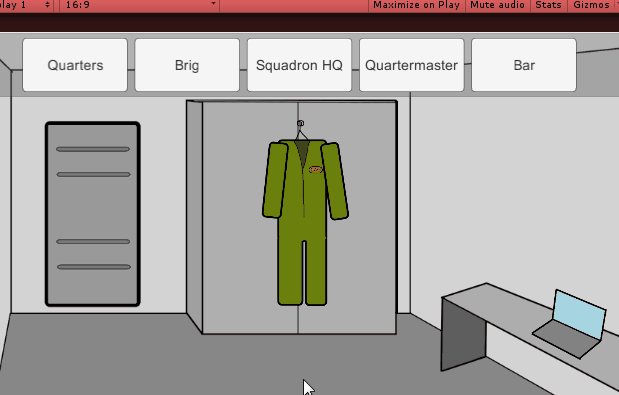
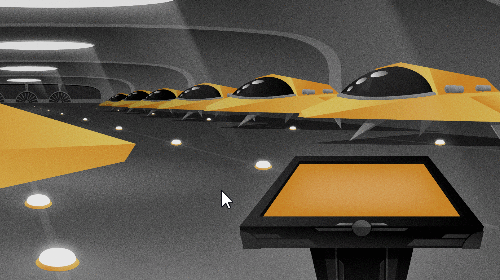
Around this time, I also got Steve Gregan on board, also from the Guild of Dungeoneering (and The Little Acre) teams, as sound designer and composer. He was working with a great guy named João Luís Gonçalves who worked on the music for the demo and trailer.
The other thing about working for profit share is that it doesn’t pay until you’re done, if at all. One usually has to take paid work as it comes up and put your profit-share project on the back burner – making it part-time or even leaving altogether. After a few months, Fred was down to one day a week on the game. It gave us a more deliberate focus, but things definitely slipped again with less hours being put in.
One bit of advice if working with friends or anyone else for profit-share: Make sure that you both treat it seriously, and communicate! Those artists that I started with who were already my friends tended to communicate less and less as they decided that they didn’t want to be on the project, and just didn’t want to disappoint me by telling me! On my end, I tended to give them extra time (a week instead of a day, then two working weeks instead of one) before I’d follow up with a message requesting the assets or a mockup or simply an answer to a design question ‘because I don’t want to be pressuring my friend when they’re working “for free”’. This caused serious delays and frustration and eventually ended the same way as if they’d just said “hey I don’t want to work on this any more and we haven’t signed anything so I’m done. You can keep the art. Thanks”.
Don’t be overly-forgiving just because you’re friends or you’re not paying them. If they agreed to profit share, then they agreed that that has potential value. They’re not working “for free” in the same way that “doing you a favour” goes. You’ve offered them value and they offered you work. Stick to that agreement, or walk away, but don’t let it fizzle out and waste your time. It’s not like you’re getting cash that they aren’t. You’re in the same boat and you should all be rowing together.
Also, do contracts! It’s not to trap anyone. It’s to protect all parties, and it also gives things an official weight that means the game is taken more seriously, which is only a good thing.
This is just my advice based on my own experiences, but know that working with your friends puts your friendships at risk – no question.
On Interns
Be careful when a college says “can I place a student with you for their work experience”. I said I could use one as long as they’re an artist, but I can’t pay. They said that’s fine and they have just the person in mind. No offense to the guy, but he was a worse artist than I was! I think I was duped by the college who just needed to get kids assigned. Lesson learned.
Being a solo dev, I was the only one around to teach the kid how to do anything, and since he couldn’t really do art and I was doing the rest, I basically had to invent busy work for him to do (some of it helpful, some not) but also had to take the time to communicate it and check it.
Overall, progress slowed when I got the wrong intern. At least it was only a couple of days a week for a couple of months.
Accountability
There are different types of person, but I’m someone who hates to let others down, whereas I find it easier to let myself down. I still hate doing it, but if you look at results, I’ll never (typically) someone down who’s counting on me, but (while I actually have pretty good self-discipline) it’s easier to sometimes fail to meet goals that I set for myself.
Before I had a team, I let the roadmap slip and slip. I’d redesign, I’d scope up and scope down, and even around the 2015/2016 New Year I almost ditched Sons of Sol to try turn Teluma into my main game (might have been good – who knows). Or to develop an RTS instead because that suddenly seemed more fun.
Once I had team mates to communicate with, who expected something finished on a given day so that they could do their work, I was far more likely to finish a task in the right way at the right time. You might too. If you aren’t working with team mates, keeping a public dev log will give you a similar sense of accountability. I do recommend it.
Partner-Funded Development
There are lots of ways to fund your game, all with pros and cons associated. In an ideal world, my preferred method would be to get funding from a publisher and pay all team members a salary. I spent a lot of time trying to interest publishers in investing in the game. I met them at GDC, at Reboot Develop, and just did some regular cold-email or referrals. I did at least get answers back from a few but nothing ever came of these interactions.
So apart from the social welfare that I received… I feel dirty writing that somehow. I don’t like getting it, but I don’t begrudge anyone who needs it either. I could write a whole other piece on the ways that the Irish government has f*cked me/my generation over (actually the original blog from 2015 probably touched on that) but I don’t have a victim mentality (any more) and it’s not relevant. Suffice it to say that I can argue that I deserve the support that I took… So, apart from the social welfare, which isn’t enough to live on with rent prices for living anywhere near Dublin being as high as they are (I live an hour away) the other thing that enabled me to enter and continue development was the support of my partner, Claire.
We’d been together over 5 and a half years when I started development. We’d emigrated to Australia together, come back, separated to put time into developing careers (in yoga and in tax), come back to living together… Anyway, there’s more about all that in the 2015 post. But where once I’d been earning more and paid more of the bills, and also invested in her training, now I was the one without income. My investment in my tax training hadn’t paid off, but her yoga training had and had led to a career. Now I needed the support, and Claire stepped up fully – no hesitation. In fact the only hesitation was my own, thinking that pursuing a career in games might not be the best financial move. Claire was there not just with money, now paying a bigger share of the rent and bills, but she is the only reason I felt brave enough to follow my dreams. Everything I’d done previously; emigration, returning, taking shitty jobs with massive commutes, taking the tax exams – it had been for her/us, and it had ended in heartbreak and a long period of anger and depression. If I could now pursue something that wasn’t necessarily the smartest idea, but that was one that would make me happy, and if she could be happy to see me do so even if the money might not follow, then it was the right move.
She constantly had my back and was encouraging and enthusiastic to see me doing something that I loved. On this she never faltered. She believed more in my abilities than I did myself. I would have quit several times over had I been with a less encouraging partner, and I’ll thank her forever for this.
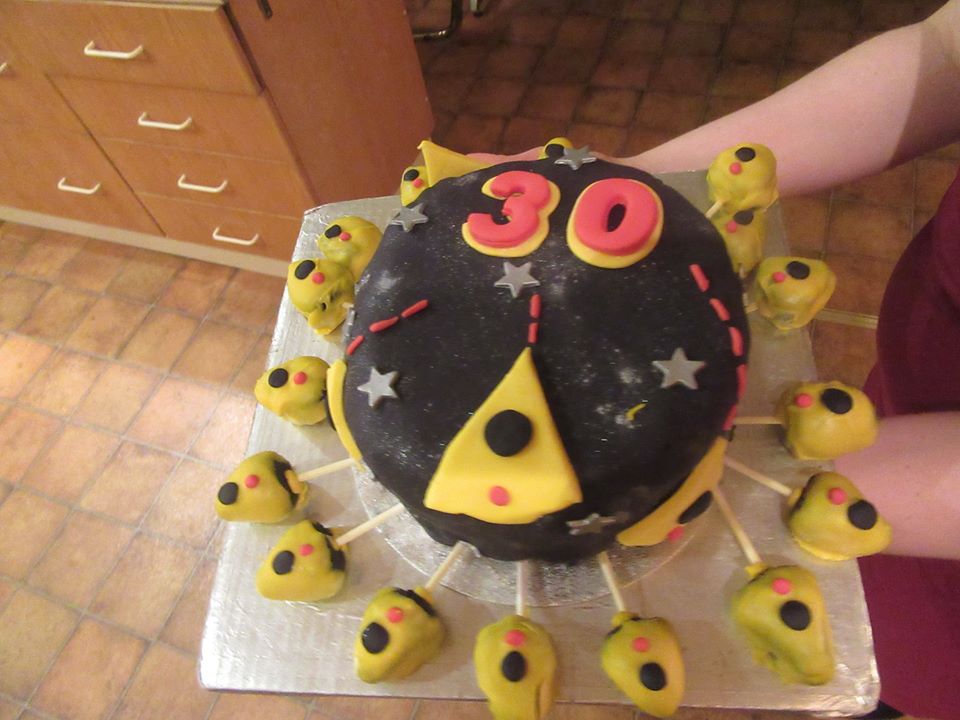
There’s a photo in the original post of the cupcakes she had made for me with my game’s ships on them. When I turned 30 in March 2017, this was the birthday cake that she had made (it was delicious!) featuring Fred’s new art for the game’s ‘Arrow’ fighters. I couldn’t have asked for a more loving or supportive partner, and I couldn’t have even begun without her. Thank you!
That said, she didn’t earn much from her job either, we just managed to live fairly inexpensively in our damp, cold, old, but cheap(ish) apartment in Bray. Day-to-day, I was definitely living below the poverty line, especially by the second year, and she wasn’t doing much better, but we managed to keep it ticking over, spending only what we earned, normally. Any big business expenses like conferences or the trademark process came out of my meagre savings, which I managed to avoid dipping into otherwise. I’m good with money, I just didn’t have much coming in, and the savings had to cover the game’s whole development costs. They were for business investment and nothing else.
Pressure placed on your relationships
The only real point of friction with Claire, even when the game was running over time, was that I’d often decline to go things because I felt that I hadn’t the time or money. As I’ve explained, that was usually true (or felt true), but it’s certainly an area I should have done better with, and actually I did do better with it when I was keeping to my daily timetable. That said, it wasn’t a major friction point anyway – just the number one issue.
But mind your relationships! My friendships especially declined as I hadn’t the money to go out to the evening showings of new movie premiers on the far side of the city, or to Airsoft, go-karting, dinner, or down to the pub regularly. I tried, and I feel I was still good at attending house parties, but I definitely drifted apart from my group of friends during this time. I’ve reconnected with many since, but for a long time it felt like Claire was the only person I saw much of. She was my best friend at least… also, that’s kind of just how relationships go I think, but still, be mindful. You need your friends and it’s not good to be all about/all over one person in general (not that I was. I’m just saying).
So we didn’t go out together as much as we could, but I tried to involve Claire in my world more, to make up for the things I felt I couldn’t do. We’d of course watch Netflix series together, or the Bond movies, or Schwarzenegger ones. The Player Too series that I wrote was my attempt to interest Claire in games and have that to share with her. I really wanted to be able to play some co-op stuff with her, or talk about what choices she made in a Telltale game or whatever, but while that went well for a while (she indulged me, I think, rather than actually being very interested herself) it kind of ended in failure when she got hooked on Stardew Valley and then swore off games completely after that. Anyway, I tried, and fun was had all the same.
After Two Years…
I mentioned that I was on a government scheme for starting your own business, and that it paid you a decreasing amount of social welfare for two years. Less than half-way through the second year, it became apparent that I wouldn’t be able to ship the game on time, and later, anywhere-close-to on time!
I didn’t know if I could get back on regular unemployment relief afterwards, though I was informed that I would be reassessed and should get it (you can just never believe anything that they tell you, is the problem). Even if I could, I’d be in a position where you have to go collect, sign on, etc, which takes time, and they can also oblige you to do certain jobs or courses that take up all your time and really give you no better chances of getting paid work. So I tried to see what else I could do for money while continuing development. I did a couple of paid blogs but it never really took off. I started asking around for part-time work and applying to accounts/admin roles if they were part-time but didn’t get any before the time was up.
When May came I did reapply for welfare and got it after a few weeks, but now had to go sign on every week and I really started to feel like a failure again. Getting off welfare in 2015 was huge. I stopped identifying as an unemployed person who makes games, and started identifying as a currently-poor self-employed indie developer. The difference to my frame of mind was huge, and this all reverted in May 2017.
All the same, I kept going. The game’s design had been pretty well nailed down, I had a strong team, we had a prototype of the main gameplay that was in people’s hands, and we just needed time to get the remaining work done. It was at least all laid out before us and the team was together.
The Side-Hustle / Workshop
Being more on the lookout for ways to earn money sooner, I started to realise that I’d been giving a lot of friends and game developers free advice regarding tax, contracts, setting up companies, and that sort of thing. I figured that if I just ran a one day workshop and charged people for the advice then I might save myself time helping people individually, and actually make some money.
I did a survey in the IrishGameDev Facebook group to see if people would be interested in such a workshop. There were enough people to make it worth exploring, so I hired a room, prepared slides, did a lot of revision, and ran the workshop on July 8th 2017.
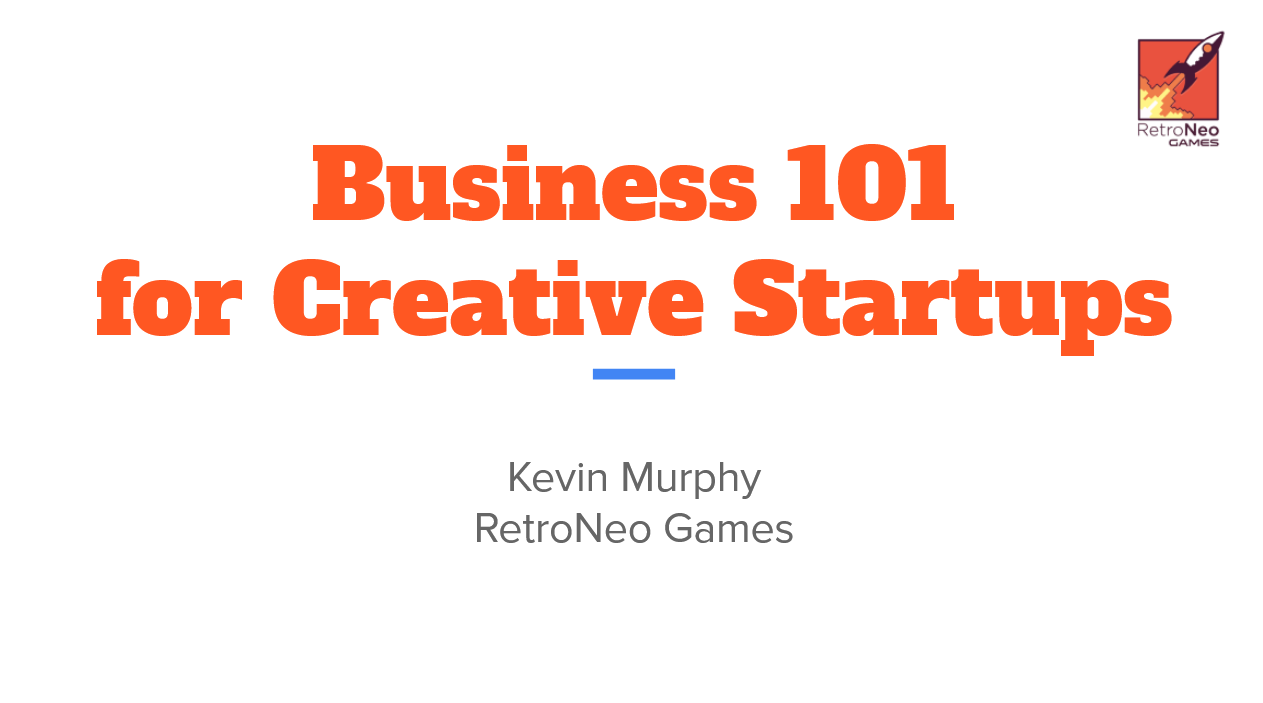
It went well! I was pleased! I’d earned my first actual self-employed income as an educator, tying together all of my previous industries, careers, education, and game dev experience. If you ignore the extensive prep time (which you could do for any future workshops on the same topic), I earned as much in one day as I’d get from 4 weeks of unemployment payments. I figured if I could run a workshop every month (on different topics, kept in rotation, and in different parts of the country), I could have a healthy income. Technically I didn’t get paid myself, mind you. The company got paid and the money only went to reduce losses for the year. There was still no profit, but since the losses/expenses were always paid out of my personal savings, this did in-effect protect my pocket, even if I didn’t get the money. Were I to run a lot of workshops it probably would turn into profit, and therefore be taxable income for the company and/or myself. Details, details…
Anyway, I was feeling good. Game dev was still a hard career. We’d failed to interest a publisher with the last demo and I’d sunk a lot of time into that effort. Our Square Enix Collective campaign hadn’t generated good numbers or interest (though the comments left were generally quite positive), and progress on the development felt like it came in fits and starts, rather than a smooth forward momentum. But I could deal with ‘hard’ as long as I could actually eat and pay rent. Also, it feels good to earn money, not just be given it. I felt like I’d solved a major problem, and the rest would fall into place.
The next day, everything changes
On the evening of July 9th, 2017, Claire and I broke up. For me it was very unexpected.
I think I’ve been very open so far with this post, but I don’t feel that it’s correct to go into much detail here. However, I simply can’t complete this story without covering this event. It should be enough to say that we weren’t fighting, we could always talk about anything, and that we still loved each other, but Claire had decided that I couldn’t provide what she now knew that she wanted for her life. She made the best move for her, and she believed it was also the best move for me – heart-breaking though it was for us both. I can’t fault her for it, but I find it hard even still to say if it was for the best. It was a tough decision, and a tough aftermath.
I haven’t directly worked on Sons of Sol since that weekend up until the time of writing; 7 months.
I don’t feel that I’d neglected Claire, but as I believe I’ve made apparent, self-employed game development has a cost on your relationships – not to mention a cost to your ability to put money away for the future, or to create a feeling like you’re making progress towards something, like a house or family. Let this serve as a cautionary tale, I guess.
I spent the first few days in total shock and anguish. I think I had my first panic attack. I couldn’t make sense of any plans for the future. They all seemed so abstract or worthless, while all my mind would do was replay every moment of our relationship and every decision, big or small, that had led us here. I couldn’t initially accept it and thought about what would have to change to get us back together. I had no qualms at all at that point about leaving the entire gaming industry behind and going back to regular boring jobs if it would help. But I also tried to respect Claire’s decision and visualise the outcomes that she’d chosen to move towards as being positive and possible. It was a very tough first few days. I met up with a few of my friends (the ones who’ll always be there for you no matter what) and they were fantastic for keeping me company and talking through this stuff. Thank you all.
I decided that I couldn’t let Claire go without fighting for her, and one night we explored all the ‘what ifs’ but she was resolute in her decision. It had been hard enough to make and it wasn’t on a whim.
At that point, I could at least begin to move forward without wondering forever “what if I’d said the right thing?”.
I know we’re getting a bit off-track for a gaming blog, but I reread the last section and decided it does all align with what I said this would be at the start, so it can stay. It does at least serve as an unofficial final entry in the Player Too series.
New Priorities
The game had been my main focus for nearly two and a half years. Now, immediately, it meant nothing to me. The ending of an almost 8 year relationship just… I don’t know how to complete this sentence, but I’m sure you get what I’m trying to communicate.
In practical terms, without Claire and I acting as a single financial unit I’d have to pay more rent and bills, and turn the office where I worked from into a bedroom and rent it out. At worst I could move home to my parents’ but I knew I couldn’t work well there (often too noisy and broadband is extremely unreliable) and I certainly knew that I didn’t want to re-enter the dating world living with my parents.
This meant that I needed more income almost immediately. The Dublin rental situation being in the shameful crisis state that it is, Claire had nowhere ready to move out to, and so moved into the spare bedroom/my office, and kept our financial arrangements the same, but clearly this would only be temporary (she was gone after a few weeks and I eventually found a nice new flat mate, moving into the office myself at that time). Needing more income meant that developing Sons of Sol full-time was no longer an option.
A matter of days later, I unfortunately also learned that our audio guy would have to leave the team for his own reasons, so now the project’s future was even more in question. I was in no condition to work on it even part-time anyway. I couldn’t look at the game just then without thinking of what it had cost me (as I interpreted the situation. It’s true, indirectly at least).
So I spoke to Fred and we agreed to put the game on indefinite hold until the situation had evened out, rather than decide to cancel or continue.
In one move, I’d lost my relationship, my job, and would quite possibly lose my home (rented, but it’s been my home for 3 years so you know what I mean). It was a hard-reset! The old way of indie game-dev life was now over for me, maybe forever.
Look After Myself
As shocked as I was, I wasn’t really feeling yet, but I knew that some rough depression was coming, possibly to be accompanied by suicidal thoughts. After all, that’s how I’d been after the last major upset in 2014 (see original post), and this was far worse. I had the presence of mind to sign up to therapy sessions for the first time. I choose to mention this precisely because I don’t want to. It’s not spoken about, so you shouldn’t speak about it, right? Well, no, that’s bullshit. Mental health needs more openness and to be less of a taboo. So there’s me doing my part for today.
But looking back, the next several months weren’t as bad as I thought they’d be. Frankly, I put this solely down to a new healthy routine because I didn’t rebound quickly, I haven’t met someone new, it took me ages to find work, or a flat mate, I was collecting unemployment, and just lonely. The only major thing that changed was my lifestyle.
I went for some extremely long walks in the first few days and lost a stone in weight before long, returning to the weight I was when I was a late teen (and healthy). Then when things got more normal I started getting up every morning at a fixed time, meditating, having a cold shower (because everything you do after that is easy), getting in 20 minutes of walking and 20 minutes of stretches, press ups, back and leg stretches (that I’ve been told to do by my chiropractor, but didn’t always complete before) then eating a healthy breakfast and ‘starting the day’ then around 10am but with my health already looked after.
Physically I soon felt great, and that had an effect on my outlook and mental health. It’s all tied together. It didn’t make the loss hurt less, but it kept me from moping around too much and getting just worse and worse. It also helped me look forward to the future (eventually).
Advice I’d give anyone doing anything, but especially to game developers spending long, lonely, stressful hours in a chair staring at a screen, is to prioritise your health. Do it! It makes everything else easier.
Fight Like Hell
So look. I’m a gamer. You’re a gamer. You’ll get this. I’m also a fan of metal music. This Doom trailer has become my mantra, and touchstone. I have it bookmarked for whenever I need a motivation boost.
Whenever I’d feel sorry for myself, or not feel like getting into the cold shower, or feel like the world has gone to shit, I watch this. It may be ‘just a game’, but take the metaphor. The Doom Marine is always moving forward, always fighting! He gets battered and takes some insane hits, but he never stops moving. Then the music drops out, the Marine lands hard and is breathing heavy. Is it over? No! The Cyberdemon’s gigantic mega-cannon charges up and points straight at Doom Marine! This is the biggest, baddest adversary yet (and the smaller ones nearly killed him). So what does Doom Marine do? Does he quit? Does he run and hide? Does he stand still and wait to get taken out? No!! As the guitar riff explodes back in he runs straight at the fucking Cyberdemon!! You know right then that he’ll never stop fighting until he’s dead and gone.
That’s my touchstone.
The music is a tight edit of New Noise by Refused. I took the audio from the game trailer and cross-mixed it with the original song to try edit out things like “rated M for mature” and to extend the final section (where the trailer ends) to loop out longer. I then made this my new alarm clock sound! Every weekday I kick off the covers, hop into a cold shower, and come out awake and pumped to take on the hardest that day has to offer.
Something more important than games
Since well before the breakup, I’ve been very upset with the state of the world since Brexit, Trump, the refugee crisis, and many other things. The absence of reason and decency is totally unacceptable to me. I didn’t want to live on this planet any more, essentially. But I had no outlet for the anger until I made ‘Fight Like Hell’ my mantra. It pushed me to keep energy high, to do the extra press ups, to go power walking in the cold and rain, and overall just not to let anything make me act as if I’m dead until I’m actually dead! And I know now that I won’t shortcut that with suicide. I lost the only thing I was truly afraid to lose and I survived it. I’ve been through a crucible and I know myself better now.
Idiocy, racism, and nationalism may be on the rise, and I may have no (romantic) love in my life right now, but that’s not the end of the story, is it? There’s still beauty, happiness and truth. I can make things better. I can keep fighting, always. I joke (kinda.. I hope) when I say this but I’m going to die fighting Nazis some day. No other way.
What does that have to do with games?
That’s been a big question on my mind for the last while. I found it hard to justify making games as distractions for increasingly entitled man-children, hiding from an increasingly upsetting world without contributing anything to it. Some gamers exhibit extremely scummy behaviour on a daily basis, and in no way do I feel like ‘serving’ them. While the truth is that I make games for myself, I still sometimes feel that I’m just distracting myself from what’s going on instead of dedicating myself to helping fix the problems that make me so upset in the first place. Someone needs to teach these guys (and it is invariably guys) what being a decent human being is about. They need to graduate from the crèche into the real world and feel responsible for something outside of themselves. I’ve given serious thought to making that a career focus of mine – basically mentorship coupled with tradition-based rites of passage into adulthood. To improve the world one man at a time. Games are art, and you can communicate messages like this, but I don’t think it helps very much. I mean actual real-life work. Blood, sweat and tears. Nothing changes in your comfort zone.
Men need to embrace feminism, for sure, but they also need a place in the world; a mission. A lot of them seem to need help finding this.
Now, in terms of helping the world through games, they are a business, and you can sustainably give business profits to worthwhile causes as charitable donations (usually tax deductible too), but that still didn’t feel good enough to me, especially as an indie where I might never make a profit, or just not enough of one to make an impact.
I do enjoy making games, and at first after the breakup I applied exclusively for games jobs (anywhere in the world) but wasn’t getting any. I wanted to lean more on my workshopping for money sooner. In September 2017 I was to speak at the Galway Games Gathering alongside John Romero, Mike Bithell, Brett Douville, and many others. It was great, but a strange experience too as I was still one-foot-in-one-foot-out of the games industry. Anyway I set up my second workshop to be in Galway for the Monday following the conference. Now, Monday isn’t a great day for availability for people, but it was the only day possible, since the conference itself was on all weekend. By one week before, I only had one sign up so I cancelled the workshop before I would owe the hotel for the room rental. So that failed.
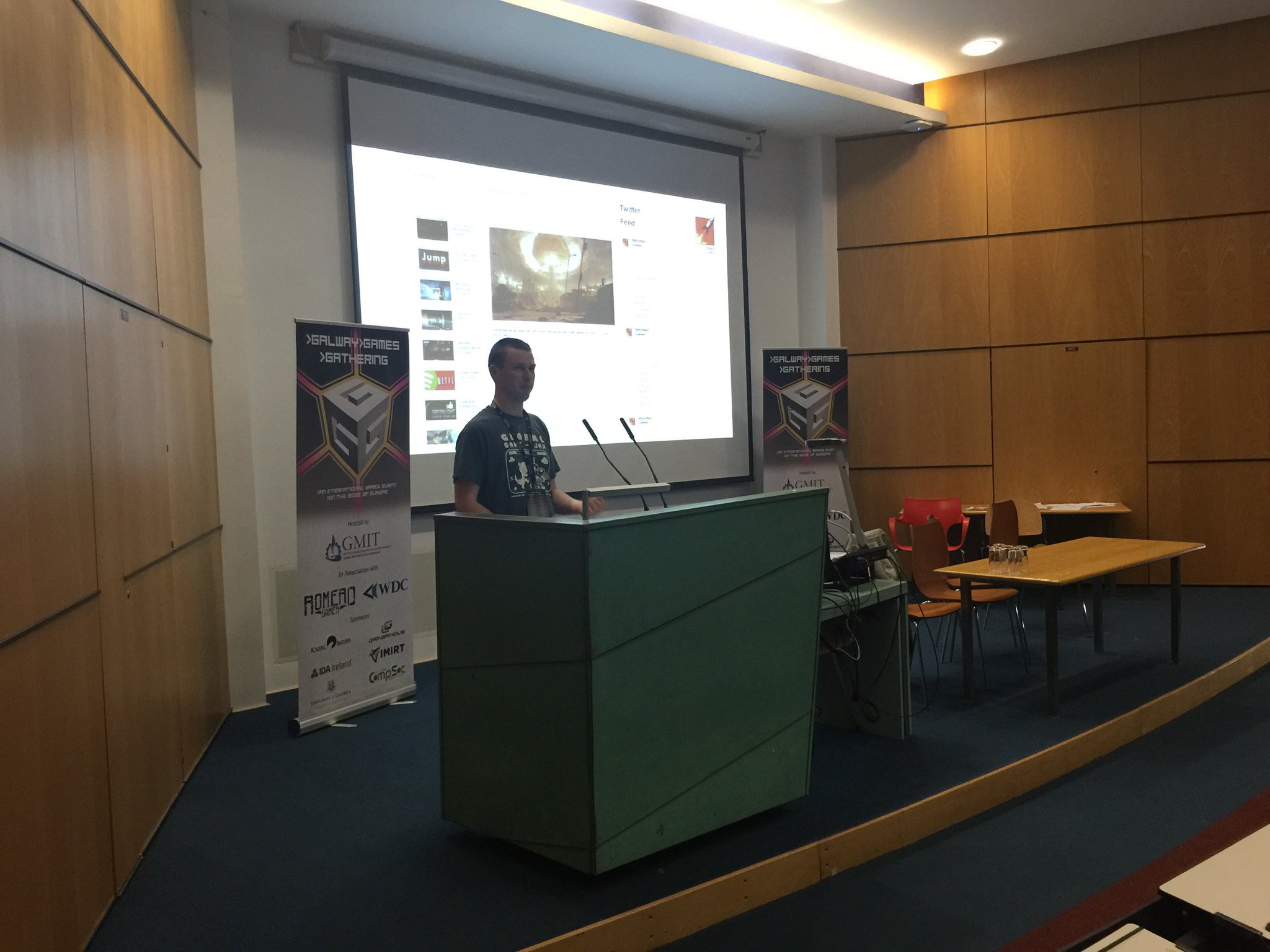
Teaching unemployed people and students isn’t very scalable, even if my first Dublin one was profitable. Ideally I wanted to do workshops for people who had money who could then hire me for individual consulting and coaching.
Coaching
I was applying for games work but getting nowhere. Note this: I am and put myself forward as an entrepreneur: someone who is creative, and likes to be self-directed, with ownership of the outcomes (and profits). Regular employers don’t really like to hire this kind of person, because they’re quite likely to abandon their job and go start a new business.
This doesn’t mean that you can’t find a job if you’ve started your own businesses, but it is something to consider. I became convinced that this was what was getting in the way of me getting any of the games, or even admin and accounts jobs that I was applying for. So, while I still applied for work, I decided I’d have to get back into self-employment, just in a more profitable area. This would have the added bonus of allowing me to help the world more directly through whatever I did next than I could if I was just doing games.
I spent a lot of time from July to November learning more about coaching, selling, motivation, psychology, nutrition, biohacking, writing, running webinars; you name it! I learned that you can’t just be a generalist when it comes to coaching, but you have to go several layers deep if you want to successfully find your niche. E.g. You’re not a ‘dating coach’. You’re ‘a dating coach for women over 40 who have their own kids, or whatever. You have to get specific.
I wanted to do one of two ideas, both of which I felt qualified to do, but with pros and cons each way.
- A “level up your business” coach, for small business owners who are running viable businesses (and so have money) but who feel too busy or overworked to actually put in extra time to move the business to the next stage. Essentially I’d use goal setting and productivity techniques to allow the owner to set up the business so that it runs itself, allowing them to start a new branch, or product, or retire!
- A “crucible coach”. Note that I hadn’t names decided upon for either approach. But this would be me helping people to channel the dark and destructive (but powerful) energies that come with major life upsets into positive life changes, like I’d done with getting fit, healthy, and starting a new business (almost). Essentially, change never happens inside your comfort zone, and uncomfortable upsets in life are unavoidable. Therefore, we will sometimes have these ‘outside your comfort zone’ moments for free, and we can learn to use them positively.
I was leaning towards the second idea when things changed again.
By the way, if anyone is interested in talking about some coaching in either area, do contact me through the ‘Contact’ tab at the top of this page. I’m happy to set up a 20 minute call pro bono and see if we both think I can help you.
“Real” Work in Games
So at this stage, it’s November 2017. I’d spent nearly 5 months drifting away from games. I was playing far less of them, not making them (I hadn’t even opened the Unity engine in this time), was failing to get responses from most of my applications (I did do two coding tests and one interview, mind you), and I generally thought that my future no longer lay in the games industry.
The only things I was still doing was my monthly blog (though I wasn’t really sure why), and the Imirt Newsletter, at Brenda Romero’s request.
Then within the span of a few days in mid-November, a months-old application that I’d made to Black Shamrock in Dublin was answered and I did a coding test for them. Then Brenda got in touch to offer me some QA (game testing) work out with Romero Games in Galway on a contract basis until Christmas (so 5 weeks).

I of course wanted to go work with the team! Most game developers or older gamers will know John Romero (the creator of the original Doom – the trailer for the reboot of which was now my personal mantra), and working alongside him surely carries certain bragging rights, but there are other reasons I wanted to go. So much of the Irish (and world) game industry and networks seem to revolve around Brenda and her work, and I wanted to get closer to that epicentre and see what I learned. I also knew at least half of the team at Romero Games already and knew them to be extremely likeable and talented game developers. Working with them would be a treat! I also love Galway and would take any excuse to spend more time there. Lastly, this would be my first paid job in the games industry, working in a real games studio with a real team, and I knew I’d learn a heck of a lot. If I was to leave the industry, I had to at least take the chance to work with Romero Games for a few weeks!
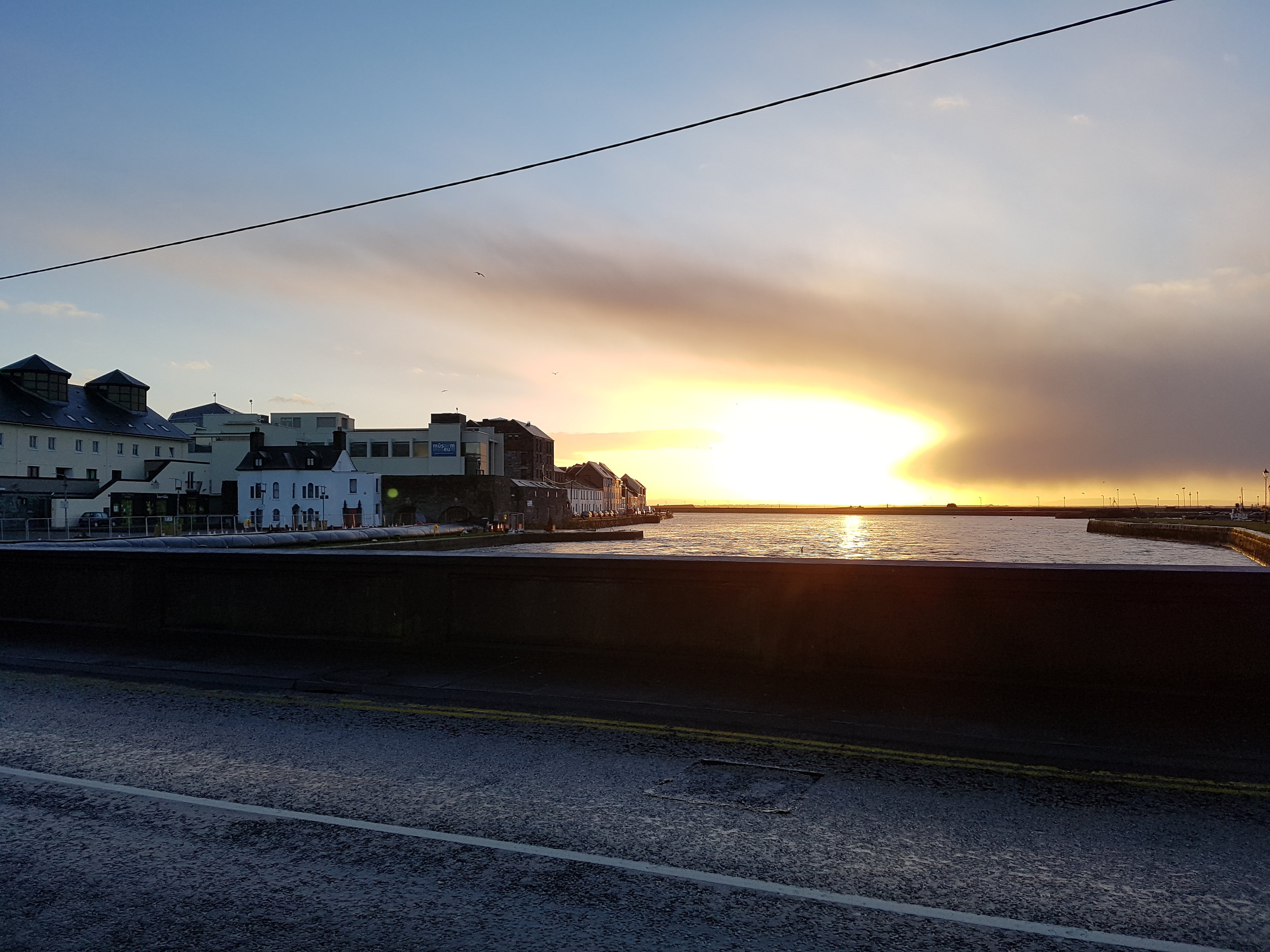
While we were setting that up, Black Shamrock got back in touch and asked to interview, based on my having done a good coding test for the Game Programmer position. I interviewed the evening before I had to catch the first train over to Galway (and had to host the Games Co-Op AND give a talk that I’d had no time yet at all to rehearse. Busy day).
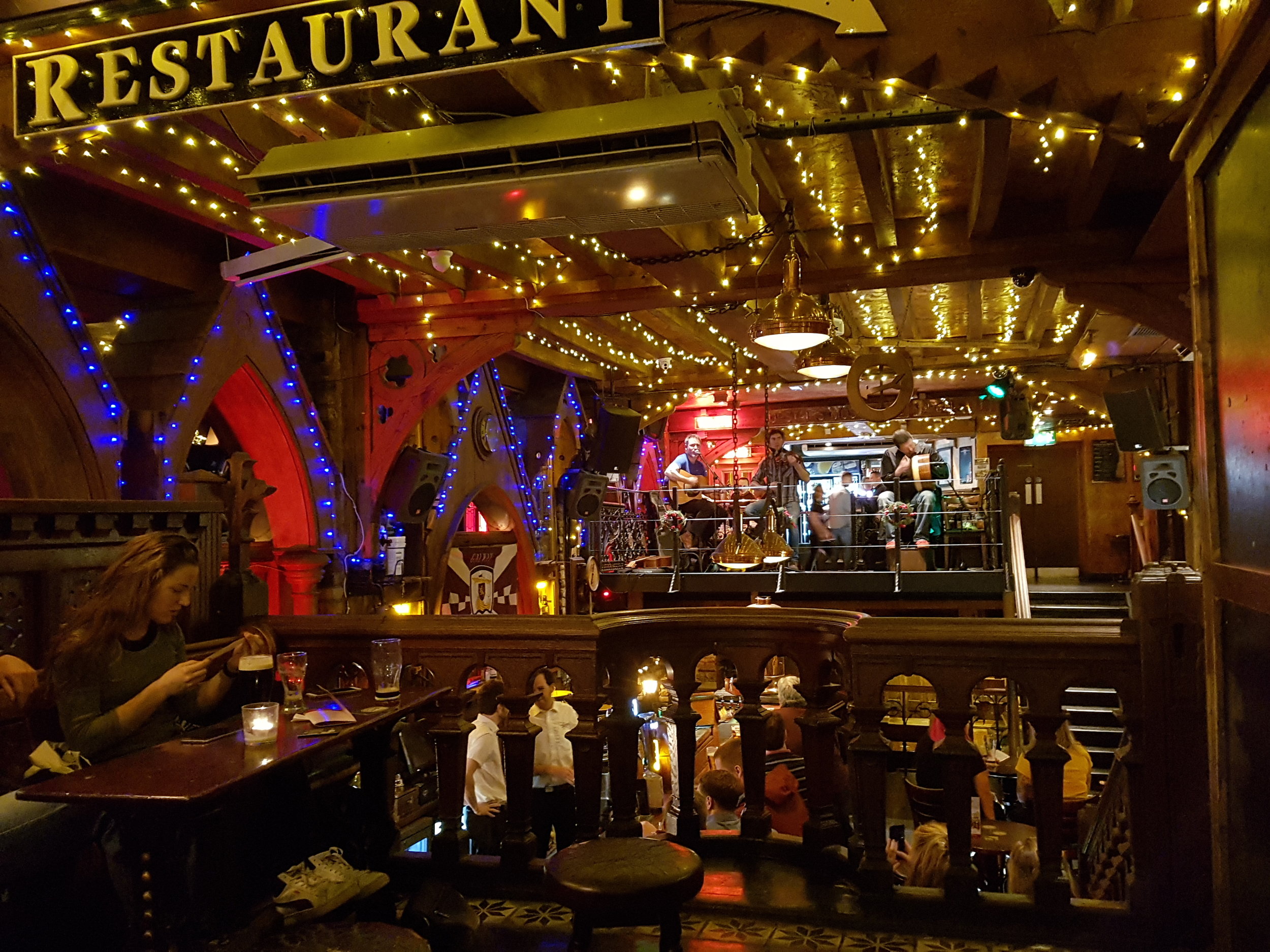
A few days later, I was offered the job in Black Shamrock to start in January after the Romero contract ended.
Wait, where am I?
The Romero job was great, and will look great on my CV for as long as I stay in games (everyone knows who they are) but getting a full-time salaried job with Black Shamrock has been transformational. I no longer feel in danger of having to move home, or feel like my next call for an interview might lead me to working in another country (though I’m totally up for this, it does make it hard to rebuild a life around such uncertainty). I now have the money (and the proximity, via a job in the city centre) to go back and do hot yoga again, and take up self-defence classes and salsa lessons. I can get take away or go out for drinks without stressing over the cost.
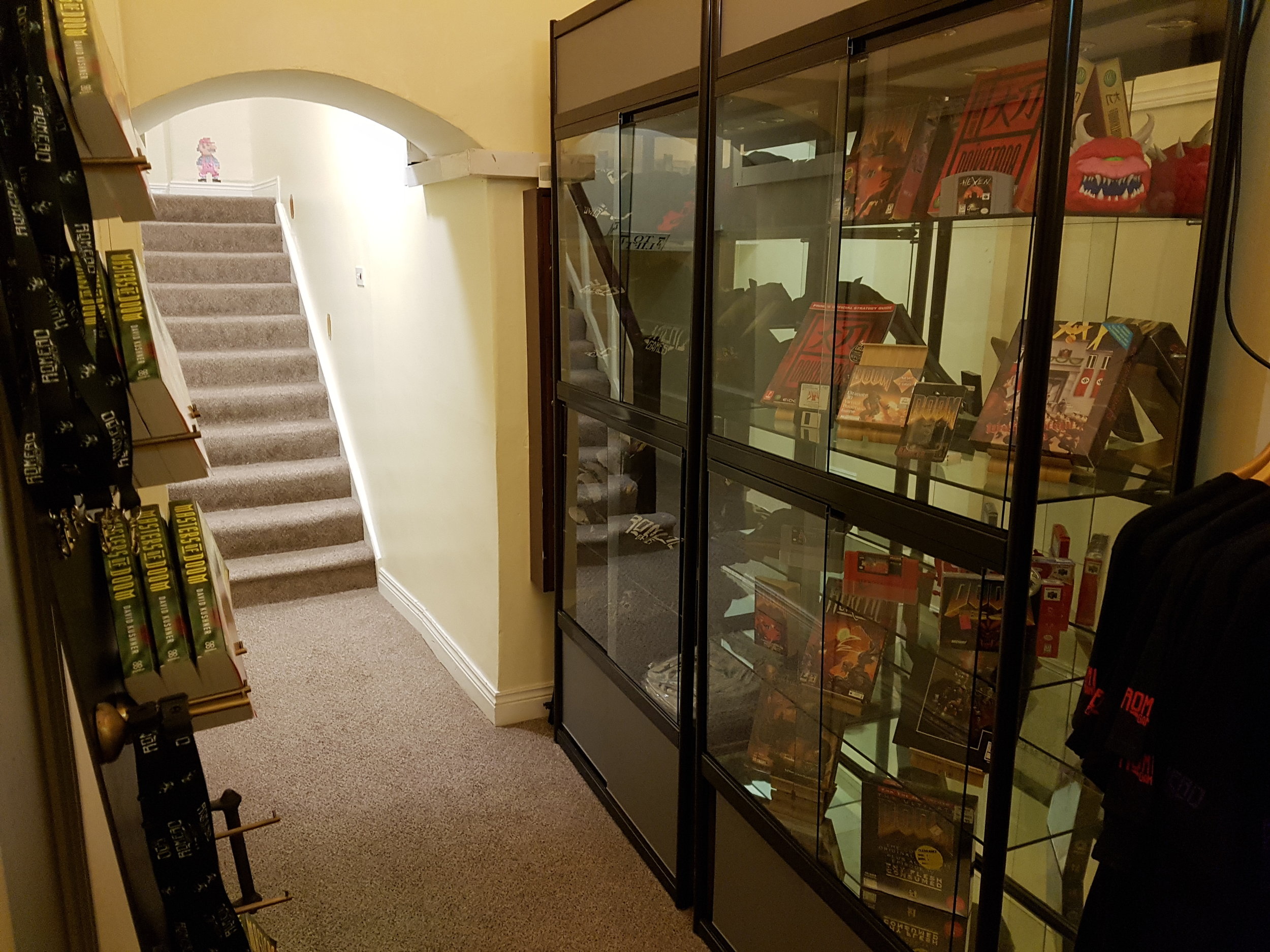
I’ve been poor a long time, so I still record absolutely everything in a budget and track my spending, but that’s just me. I actually find it fun to balance the books at the end of the month and measure my spending. The things that I mentioned above were seriously outside of my ability to do before on a regular basis, though they probably sound normal or boring to most people.
This is what graduating from an unpaid indie dev to a paid game developer feels like.
Rising above the poverty line feels like coming up for air after a deep dive under water. To be valued for skills that I taught myself is also quite rewarding. It feels the same as when I got my first full-time job after college, or when I did the same in Australia after months of eating into my savings looking for work.
I’m a month into the job and I enjoy it more than any other paid job I’ve ever done (there are no phones to answer there either. Yay!) but it’s still a strange reset. I’d mentally already left the games industry. It was a hard sell to myself because it’s so fun, so creative, fairly lucrative (if you’re in the right places) but I just had to convince myself that there was more important work that needed doing. I made that idea a part of me in my healing process since the breakup, and now it’s there largely unaddressed while I program games all week.
I have plans to volunteer, at least. I give a lot more change to the homeless now. I’ve been helping a friend through a situation, and I could still take one or two clients on for coaching and help them to make the world better.
I also got recycling bins into the office in my first month and set up weekly fruit deliveries so everyone can eat a bit healthier. Entrepreneurial traits when used inside an existing organisation are called intrapreneurship. I’m very happy to have supportive management who encourage that, but we’re part of a large multinational group, so there’s only going to be so much that I can do. I think that to satisfy any philanthropic endeavours I’ll have to do it outside the workplace.
Anyway, it’s been a hell of a few months, but I feel like I’m finally coming in to land, now.
Sons of Sol
We come now full-circle to the game that started it all. A large reason that we put the game on hold was that if I took a job in a games company, it would likely have a non-compete clause in the contract that might mean that I couldn’t work on my own games. This might have forced us to cancel the game anyway, so working on it was pointless until I found a new job/source of income.
As it stands, we’re legally able to work on it, if I can find the time for it.
I want to finish the game. That’s clear to me now again, which it honestly wasn’t before. I was too burned out on it and too upset to look at it. Time has made me appreciate the game mechanics again and I see value in it as a unique game that some people love playing and that others just don’t get. It’s worth finishing and putting out into the world.
The trick is, of course, how to find the time to develop a game alongside full-time work. It’s the topic of countless GDC talks or Gamasutra articles. It can be done, I know, but I also know how demanding it is. I’m also trying to reclaim my life and meet new people and old friends more regularly now that I can afford to. I don’t want to give up one of my two weekend days right now to give over to developing a game for another year or two. I know that it will never get done on weeknights, at least not with my commute being as long as it is currently. Working a long day and then starting another brain-heavy job is just folly. You can’t make a good game using only your least productive hours. You may as well rest weeknights and do a productive Sunday morning or something.
The game will also need to be redesigned to its simplest possible (but still worthwhile) form. Any notions of modability, multiplayer deathmatch, or local co-op are now totally gone. We’ll likely further limit the number of ships and mission types planned (they can always be patched in later if the game is going well).
The coming weeks or months of game design will be a real exercise in trimming the fat. I won’t start any coding until I have a modest number of tasks attached to a roadmap that I can keep to. If I can’t reach that stage then the game can’t get made right now. It’s that simple.
Refunds
During our Steam Greenlight campaign last year I offered some limited €5 preorders of the game. I have the emails of everyone who purchased and I’ll be in touch to offer them refunds. With the game’s future in question, and certainly a major delay involved, it’s only right to offer the money back. I say it here just in case anyone has ditched an old email address and would otherwise not hear of the offer. Well, also for transparency.
The real winners here, of course, are Paypal and Stripe, who naturally get commission on the money as it’s sent both ways. That’s the real business to be in! 😛
In Conclusion
I can’t even… I wrote ‘in conclusion’ because it’s always the last section of the blog posts but I’m not going to attempt to summarise all of that.
I hope that the story entertained. I hope you’ve gained something from an open, honest case study of one indie game developer’s career, and some of the struggles you could face.
Mixed with that of course, was my personal story, and I hope it didn’t bore you, but it was too tied up in the indie dev story to really separate it. I found it very hard to write, but I guess kind of therapeutic too.
Thankfully my ‘Fight Like Hell’ mantra really protects me from stressing over things like “what if people think I’m self-indulgent for writing about myself”. For one thing, I know that most people won’t think that. Maybe a couple will, and they likely won’t ever say anything, but if they do; so what? It’s such a trivial concern, yet it would have loomed large in my mind just a couple of years ago (like when I wrote the original piece). Now I just have a different perspective. I know that what I’ve written will have some value to some people (even in this almost 10,000 word form – seriously, well done for reading! Thanks!), and that’s why it exists. It’s not for anyone else.
Blogging in Future
I’m officially releasing myself from my ‘one blog per month’ goal. As this latest post has really shown me, it takes considerable time to write and edit even the short ones. One day a month to blog could now be one more day per month to work on Sons of Sol. SEO won’t increase sales of the game through accidental traffic in all likelihood. I know that. It started as ‘one of those things you should do’ and it kept going. There have been benefits, like getting asked to speak at certain events, but I think at this stage that I’m better off reclaiming the time and blogging when inspiration strikes, or keeping the topics related purely to Sons of Sol’s development.
I will write again though, so I’ll use my usual sign off:
Until next time…
